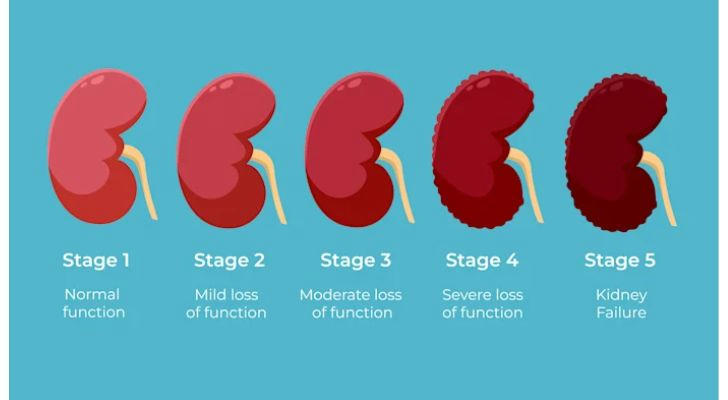How Long Can a Person Live With Kidney Failure?
Kidney failure can feel frightening, confusing, and overwhelming. When doctors say that the kidneys have stopped working properly—often called end-stage renal disease (ESRD)—it is natural to wonder what life will look like moving forward. One of the most common questions families ask is: “How long can a person live with kidney failure?”
The answer is not the same for everyone. Life expectancy depends on a wide range of factors, including the type of treatment chosen, age, overall health, lifestyle, and how well the individual follows medical recommendations. This article breaks down the major factors and explains what people can expect, written in clear, caring language.

Life Without Treatment: Days to Weeks
Without any form of treatment—meaning no dialysis and no kidney transplant—a person with complete kidney failure usually survives several days to a few weeks. This is because when kidneys stop working:
- Toxins build up quickly
- Fluid accumulates in the lungs
- Electrolyte levels become dangerously unstable
Most patients who decline treatment enter hospice care, where the goal is comfort, not extending life. Symptoms such as fatigue, confusion, nausea, or difficulty breathing are managed compassionately.
Life With Dialysis: Several Years or Even Decades
Dialysis is the most common treatment for kidney failure. It performs the kidneys’ job by removing wastes, salts, and excess water from the blood.
There are two main types:
- Hemodialysis (usually done 3 times a week at a clinic)
- Peritoneal dialysis (done daily at home)
Average Life Expectancy on Dialysis
On average, people live about 5–10 years once they begin dialysis. However—this is only an average. Many people live much longer.
Some people live 20–30 years on dialysis
Advances in medical technology and better dialysis care have made long-term survival more common. Younger patients, or those without major health problems, can live for decades with proper treatment.
Factors that affect survival on dialysis include:
- Age Younger individuals typically live longer.
- Other health conditions Heart disease, diabetes, or high blood pressure can shorten life expectancy.
- Consistency Attending dialysis on schedule and following fluid/diet rules dramatically improves outcomes.
- Lifestyle Not smoking, eating a kidney-friendly diet, and staying active all help.
- Quality of dialysis care Centers with experienced nephrologists and modern equipment often achieve better results.
Dialysis keeps a person alive, but it also brings limits: strict diet control, fatigue, and time-consuming treatments. Still, many patients continue working, traveling, and enjoying life for years.
Life After a Kidney Transplant: 10–20+ Years
A kidney transplant generally offers the longest and highest-quality life for people with kidney failure.
Average Transplant Survival
- A deceased-donor kidney typically lasts 10–15 years.
- A living-donor kidney often lasts 15–20 years or more.
Some people receive more than one transplant over their lifetime.
Benefits of a transplant:
- More freedom and energy
- No need for dialysis
- Fewer diet restrictions
- Longer life expectancy
However, not everyone qualifies for transplant, and wait times for organs can be long. Patients need to take immune-suppressing medication for life to prevent rejection.
What Improves Life Expectancy the Most?
1. Early diagnosis & consistent follow-up
Seeing a nephrologist regularly helps slow progression and catch complications early.
2. Strict fluid and diet control
Especially for dialysis patients, managing salt, potassium, and phosphorus levels reduces hospitalizations and heart problems.
3. Managing underlying conditions
Since diabetes and high blood pressure cause most kidney failures, controlling these conditions significantly impacts survival.
4. Staying active
Even light exercise improves heart health, energy levels, and overall well-being.
5. Emotional and social support
Stress and depression can affect treatment success. Support from family, friends, or counselors helps people stay motivated and engaged in care.
Quality of Life Matters as Much as Length
A key part of treating kidney failure is recognizing that life expectancy is only one piece of the picture. Many patients live meaningful, active lives with:
- Successful careers
- Strong family connections
- Travel and hobbies
- Community involvement
With the right medical care, lifestyle adjustments, and support system, many people find a “new normal” after diagnosis.
Final Thoughts
So, how long can a person live with kidney failure?
- Without treatment: days to weeks
- With dialysis: years to decades
- With a transplant: often 10–20+ years
Every person’s journey is unique. Medical care, lifestyle habits, emotional health, and strong support all play major roles. Most importantly, kidney failure does not erase the possibility of a meaningful, fulfilling life.
If you need help turning this into a Facebook post, SEO article, or a more medically detailed version, I can rewrite it for you.
